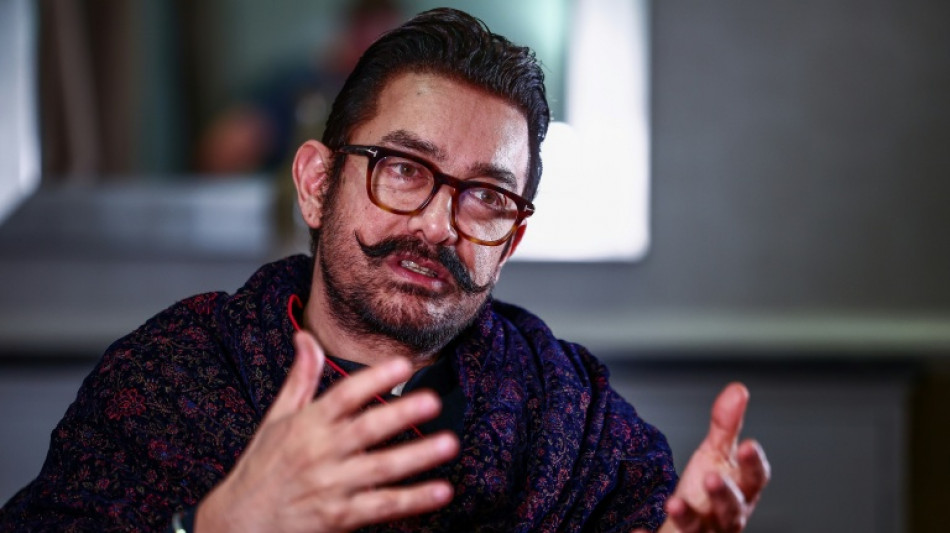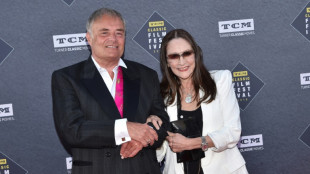

No quitting: Bollywood's Aamir Khan wants to keep acting
During the Covid-19 pandemic, Bollywood superstar and filmmaker Aamir Khan considered quitting cinema for good after dominating the Indian film industry for more than four decades.
"It was in the middle of Covid and I was... thinking of a lot of things, and I suddenly felt that I had spent all of my adult life in this magical world of cinema," Khan told AFP in London, draped in a heavy purple shawl and sporting a handlebar moustache.
He is not wrong, having helped shape Indian cinematic culture for years, becoming one of Bollywood's most popular actors.
He has amassed a formidable oeuvre of Hindi-language films, including "Lagaan", nominated for best foreign language film at the Oscars in 2002, as well as movies such as "3 Idiots", "Dangal" and "Taare Zameen Par" (Like Stars on Earth).
Starting as a child actor in the 1970s and synonymous with Bollywood ever since, Khan realised he had "not really given the kind of bandwidth to my personal life that I would have liked to".
"The realisation that I've lost all that time was something that I was finding difficult to come to terms with and I was going through a lot of guilt... My knee-jerk reaction to that was that I've had enough of film," Khan said.
However, his family, including two children, eventually convinced him not to retire. "In my head, I quit. And then I didn't," said Khan.
Now, turning 60 in March, Khan, who lives in Mumbai, wants to "continue to act and produce for some time".
He also wants to use his company Aamir Khan Productions "as a platform to encourage new talent... whose sensibility is close to mine. And (who) want to tell stories which affect me."
- 'Jumping genres' -
One of those stories was "Lost Ladies", a Hindi-language comedy about two young brides, which he co-produced with his ex-wife Kiran Rao and was recently promoting in London.
It was released this year, becoming India's entry for the Oscars foreign film category.
Khan and Rao's partnership on "Lost Ladies" began when Khan spotted its script at a screenwriting competition which he was judging, leading him to suggest that Rao direct the film.
"I like to react organically to material that comes my way. I feel that a film should begin with the writer, the thought," Khan said.
"I like that the story should emerge from the writer and then, as a producer or as an actor, I come in at the right time, when I deserve to," he added.
Many of his films touch on social issues in India, from women's rights in rural areas and the sports industry, to the toxic culture in higher education and disability rights.
However, Khan has refused to be boxed into just one type of movie or role.
"I'm happy to jump genres and, experiment with different kinds of stories. I like to surprise myself and my audience."
He is also not afraid to admit slip-ups, and has been vocal about his disappointment with his last performance in "Laal Singh Chaddha".
The 2022 Indian adaptation of Tom Hanks's "Forrest Gump" was a rare blip in the otherwise glowing critical reception of Khan's work.
"I'm not really happy with my last performance, actually," said Khan, adding that he thought he was too high-pitched in the role.
"I hope this one's better," he said of his upcoming film "Sitaare Zameen Par", which he says is a "thematic" sequel to "Taare Zameen Par", a drama about special needs education.
Despite winning dozens of Indian film awards as well as India's third-highest civilian award, the Padma Bhushan, Khan still grounds his idea of success in the film itself.
"Filmmaking is very difficult... telling a story through so many art forms which come together to form cinema," he said.
"So when I look at the film that we've made, and then I look at the script that we set out with, (I ask): has the film reached where we thought it would?"
"And if we've reached where we wanted to, and we've made the film that we set out to, then it's a big relief."
Ch.Driskell--IP




